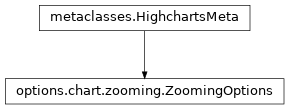.zooming
class: ZoomingOptions
- class ZoomingOptions(**kwargs)[source]
Chart zooming configuration.
Class Inheritance

- copy(other=None, overwrite=True, **kwargs)
Copy the configuration settings from this instance to the
otherinstance.- Parameters:
other (
HighchartsMeta) – The target instance to which the properties of this instance should be copied. IfNone, will create a new instance and populate it with properties copied fromself. Defaults toNone.overwrite (
bool) – ifTrue, properties inotherthat are already set will be overwritten by their counterparts inself. Defaults toTrue.kwargs – Additional keyword arguments. Some special descendents of
HighchartsMetamay have special implementations of this method which rely on additional keyword arguments.
- Returns:
A mutated version of
otherwith new property values
- classmethod from_dict(as_dict: dict, allow_snake_case: bool = True)
Construct an instance of the class from a
dictobject.
- classmethod from_js_literal(as_str_or_file, allow_snake_case: bool = True, _break_loop_on_failure: bool = False)
Return a Python object representation of a Highcharts JavaScript object literal.
- Parameters:
as_str_or_file (
str) – The JavaScript object literal, represented either as astror as a filename which contains the JS object literal.allow_snake_case (
bool) – IfTrue, interpretssnake_casekeys as equivalent tocamelCasekeys. Defaults toTrue._break_loop_on_failure (
bool) – IfTrue, will break any looping operations in the event of a failure. Otherwise, will attempt to repair the failure. Defaults toFalse.
- Returns:
A Python object representation of the Highcharts JavaScript object literal.
- Return type:
HighchartsMeta
- classmethod from_json(as_json_or_file, allow_snake_case: bool = True)
Construct an instance of the class from a JSON string.
- Parameters:
as_json_or_file – The JSON string for the object or the filename of a file that contains the JSON string.
allow_snake_case (
bool) – IfTrue, interpretssnake_casekeys as equivalent tocamelCasekeys. Defaults toTrue.
- Returns:
A Python objcet representation of
as_json.- Return type:
HighchartsMeta
- get_required_modules(include_extension=False) List[str]
Return the list of URLs from which the Highcharts JavaScript modules needed to render the chart can be retrieved.
- to_dict() dict
Generate a
dictrepresentation of the object compatible with the Highcharts JavaScript library.Note
The
dictrepresentation has a property structure and naming convention that is intentionally consistent with the Highcharts JavaScript library. This is not Pythonic, but it makes managing the interplay between the two languages much, much simpler.
- to_js_literal(filename=None, encoding='utf-8') str | None
Return the object represented as a
strcontaining the JavaScript object literal.
- to_json(filename=None, encoding='utf-8')
Generate a JSON string/byte string representation of the object compatible with the Highcharts JavaScript library.
Note
This method will either return a standard
stror abytesobject depending on the JSON serialization library you are using. For example, if your environment has orjson, the result will be abytesrepresentation of the string.- Parameters:
- Returns:
A JSON representation of the object compatible with the Highcharts library.
- Return type:
- static trim_dict(untrimmed: dict, to_json: bool = False) dict
Remove keys from
untrimmedwhose values areNoneand convert values that have.to_dict()methods.
- static trim_iterable(untrimmed, to_json=False)
Convert any
EnforcedNullTypevalues inuntrimmedto'null'.
- property key: str | None
Sets a key to hold when dragging to zoom the chart.
Hint
This is useful to avoid zooming while moving points.
Hint
This should be set to a different key than
ChartOptions.pan_key.Accepts the following values:
'alt''ctrl''meta'(the command key on Mac and Windows key on Windows)'shift'.
The keys are mapped directly to the key properties of the click event argument (
event.altKey,event.ctrlKey,event.metaKey, andevent.shiftKey).
- property mouse_wheel: bool | MouseWheelOptions | None
Configuration of how users can use the mouse wheel to control zooming within the chart.
Note
Zooming via the mouse wheel is enabled by default. To disable, set this option to
False.Note
Zooming via the mouse wheel is a feature included in Highcharts Stock, but is also available in Highcharts Core by loading
modules/mouse-wheel-zoom.js.- Return type:
- property pinch_type: str | None
Equivalent to
.typebut for multi-touch gestures only. Defaults to'x'.Accepts:
'x''y''xy'
If not specified explicitly, the pinch type is the same as the
.type. However, pinching can be enabled separately in some cases, for example in stock charts where a mouse drag pans the chart, while pinching is enabled. WhenTooltip.follow_touch_move()isTrue, pinch type only applies to two-finger touches.
- property reset_button: ResetZoomButtonOptions | None
Configuration settings for the button that appears after a selection zoom, allowing the user to reset zoom.
- Return type:
ResetZoomButtonOptionsorNone
- property single_touch: bool | None
If
True, enables zooming with a single touch (in combination with.type) while two-finger pinch will still work as per.pinch_type. Defaults toFalse.Warning
Enabling zoom by single touch will interfere with touch-dragging the chart to read the tooltip, and if vertical zooming is enabled will make it hard to scroll vertically on the page.